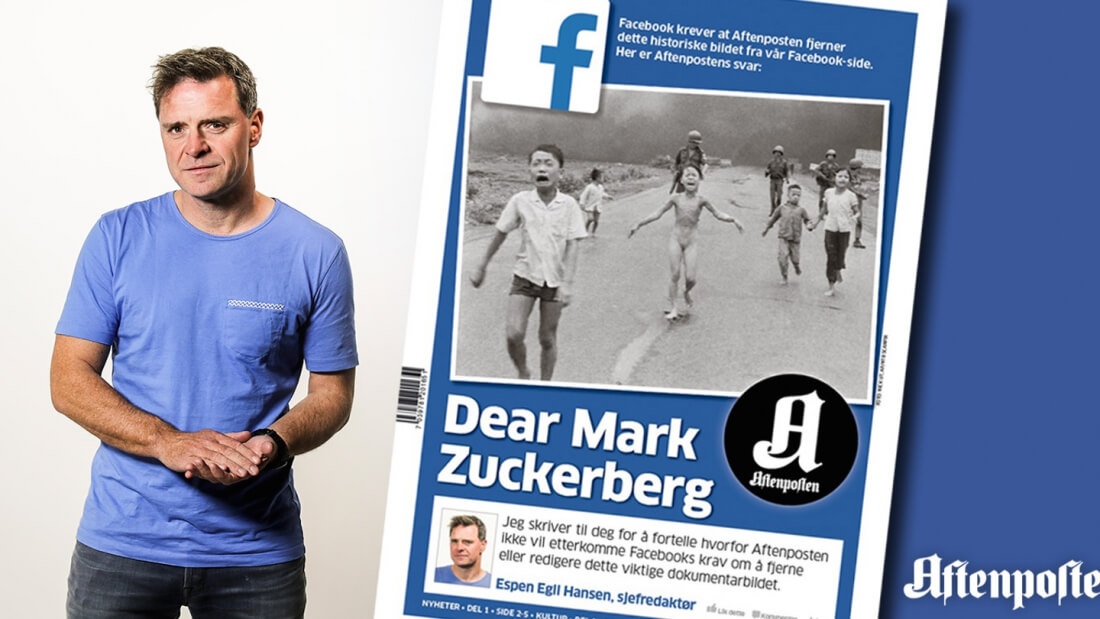Facebook has been criticized over its policies regarding censoring. In an open letter to Mark Zuckerberg, the editor-in-chief and CEO of Aftenposten, Norway's largest newspaper, blasted the social network's decision to delete the historic "Napalm Girl" photograph taken during the Vietnam war because it violated the site's policy on nudity.
Update: As controversy escalated, Facebook is now in the process of reinstating the famous war photo. Facebook's official response on the matter can be read at the bottom of this post.
A few weeks ago, Norwegian writer Tom Egeland created a Facebook post called "seven photographs that changed the history of warfare." One of the images was The Terror of War by Nick Ut, which shows several children running from a napalm attack during the Vietnam war. Among them is naked 9-year-old Kim Phúc.
Facebook proceeded to delete the post and suspend Egeland's account. Aftenposten then reported the incident - using the same photo in its article - and shared the item on its Facebook page. Facebook responded by demanding that the publication "either remove or pixelize" the image.
"Any photographs of people displaying fully nude genitalia or buttocks, or fully nude female breast, will be removed," Facebook said in the notice. But before the paper could respond, the article and image were deleted from its Facebook page.
In an open letter, editor-in-chief Espen Egil Hansen called Zuckerberg the "world's most powerful editor," and lambasted the company's decision to remove the photograph.
Even though I am editor-in-chief of Norway's largest newspaper, I have to realize that you are restricting my room for exercising my editorial responsibility," he wrote. "I think you are abusing your power, and I find it hard to believe that you have thought it through thoroughly.
If you will not distinguish between child pornography and documentary photographs from a war, this will simply promote stupidity and fail to bring human beings closer to each other.
Responding to a Guardian request for comment, a Facebook spokesperson said: "While we recognize that this photo is iconic, it's difficult to create a distinction between allowing a photograph of a nude child in one instance and not others. We try to find the right balance between enabling people to express themselves while maintaining a safe and respectful experience for our global community. Our solutions won't always be perfect, but we will continue to try to improve our policies and the ways in which we apply them."
Facebook has been having a difficult time recently when it comes to relations with the media. Earlier this year, a former member of Facebook's Trending Topics curation team said they were told to routinely suppress news stories that supported conservative political viewpoints. Last month, the company removed its editorial team, replacing them with algorithmic process that managed to push a fake news story to the top of trending list.
Here is Facebook's response after they decided to reinstate the iconic war photo:
After hearing from our community, we looked again at how our Community Standards were applied in this case. An image of a naked child would normally be presumed to violate our Community Standards, and in some countries might even qualify as child pornography. In this case, we recognize the history and global importance of this image in documenting a particular moment in time. Because of its status as an iconic image of historical importance, the value of permitting sharing outweighs the value of protecting the community by removal, so we have decided to reinstate the image on Facebook where we are aware it has been removed. We will also adjust our review mechanisms to permit sharing of the image going forward. It will take some time to adjust these systems but the photo should be available for sharing in the coming days. We are always looking to improve our policies to make sure they both promote free expression and keep our community safe, and we will be engaging with publishers and other members of our global community on these important questions going forward.
